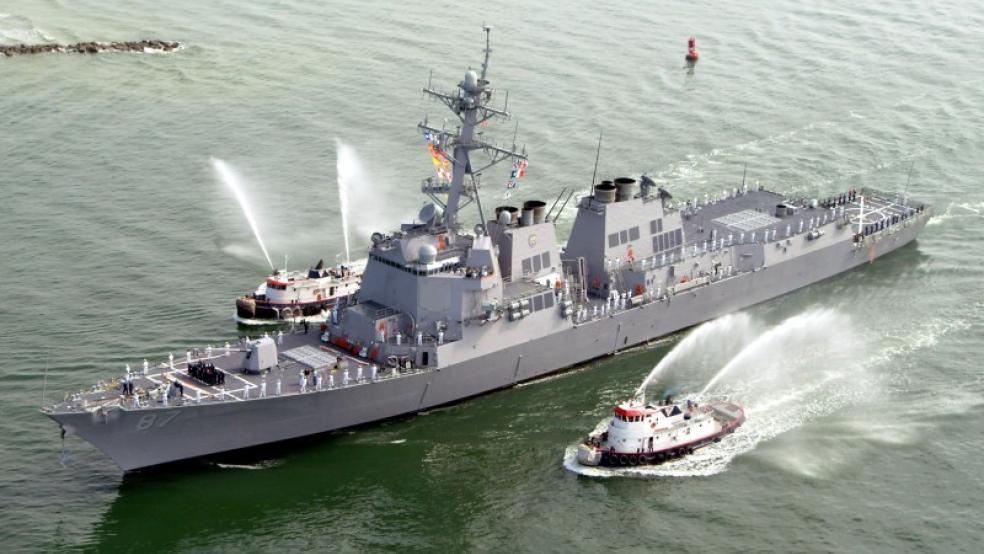When a U.S. vessel off the coast of Yemen fired on Houthi rebels Thursday, it sent another of the Obama administration’s delicate balancing acts in the Middle East off the rails. Is the president who says he’s dedicated to getting the U.S. out of the region’s wars now dragging us into another one before he leaves office?
The U.S. was in an untenable position in the Yemeni conflict even before the U.S.S. Nitze sent cruise missiles into three radar installations controlled by Houthis, who are Shi’a and who ousted the Sunni government in Sanaa early last year. It has since chided the Saudis from time to time – weakly and ineffectively -- while indirectly supporting their savage and apparently indiscriminate bombing campaign against the Houthi who Riyadh casts (inaccurately) as creatures of the Shi’a regime in Tehran.
If that sounds like another bowl of noodles, with U.S. interests a tangled mess running every which way, it should because it is. As of Thursday, Obama is certain to serve it, piping hot, to his successor in November.
President Obama reportedly signed off on the missile launches. Here are four reasons he should not have:
• Retaliation was unnecessary. The Pentagon hauled out a lot of boilerplate to explain its response—self-defense, protecting U.S. personnel, freedom of navigation, and global commerce—but it doesn’t match the situation. The missiles fired from Houthi-controlled territory fell well wide of U.S. ships. Given the broader circumstances in all their complexity, there was no justification for a military response.
Strong diplomatic language was the proper tool, considering the Houthis’ relatively primitive military resources. But this appears to be yet another judgment that originated at the Pentagon, not the White House and not the State Department. It’s Defense, we ought to note, that handled all the public relations—and pointedly asserted that it had Obama’s blessing.
• The U.S. is badly aligned. Even before the Navy’s retaliation Thursday, the U.S. was drawing increasing criticism for supporting the Saudis’ indefensible behavior. The U.N. reports that the bombing campaign has already killed more than 4,000 Yemenis. An airstrike in Sanaa last weekend killed at least 140 people attending a funeral.
That attack prompted the White House (finally) to announce that it would review U.S. military assistance to the Saudis. That was the right direction to take. In a matter of days, the administration has turned 180 degrees—implicitly but unmistakably lining up behind the Saudis.
It’s inexplicable—and a grave error. Here’s an occasion that truly calls for balance: The administration could have told Riyadh to stop the aggression based on the longstanding relationship between the U.S. and Yemen.
• Ignoring the obvious. The Obama administration has ignored for too long Saudi Arabia’s decision to go its own way in the region. This has been increasingly clear for several years—especially since a younger generation has emerged in Riyadh.
The Saudis, don’t forget, were vigorously opposed to the 2003 invasion of Iraq; more recently, there have been major differences over Syria. But the crowning blow was the Iran nuclear deal since Riyadh sees itself as in an existential power struggle with Tehran. It’s plain now that ties between Washington and Riyadh will never again be aligned as they were for many decades.
Yemen is one reason, Syria’s another. The U.S. should recognize chill and conduct policy by reconsidering its interests and alliances. Instead, the Obama administration appears intent on pretending all is as it has been, possibly because it has no idea how to rethink policy.
This will cost us. The next president will have to set a new course quickly and squarely.
• The Iran deal is endangered. While Tehran didn’t invent the Houthis, they are an indigenous movement and they are not the proxies of Iran the Saudis make them out to be. The sectarian dimension of the Yemeni conflict is obvious, and yet another big reason the Navy ought to have exercised restraint.
The background here is the deep chasm the Iran nuclear accord has opened in Washington and the increasingly evident animosity between the Pentagon and State. Given Obama’s commitment to the nuclear pact, any move that endangers it is a mistake.
Signing off on the cruise missiles Thursday was one. Tehran is almost certain to assume that Obama has just signaled a limit to his commitment and the Saudi relationship defines it.
The Navy’s move, with Obama’s signature on it, is a stunner however one slices it. The president may have just reclassified his signature diplomatic achievement as damaged goods and weakened the White House’s power by ceding policy to the Pentagon’s advantage.






